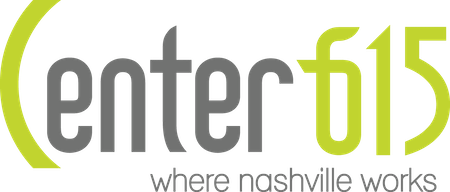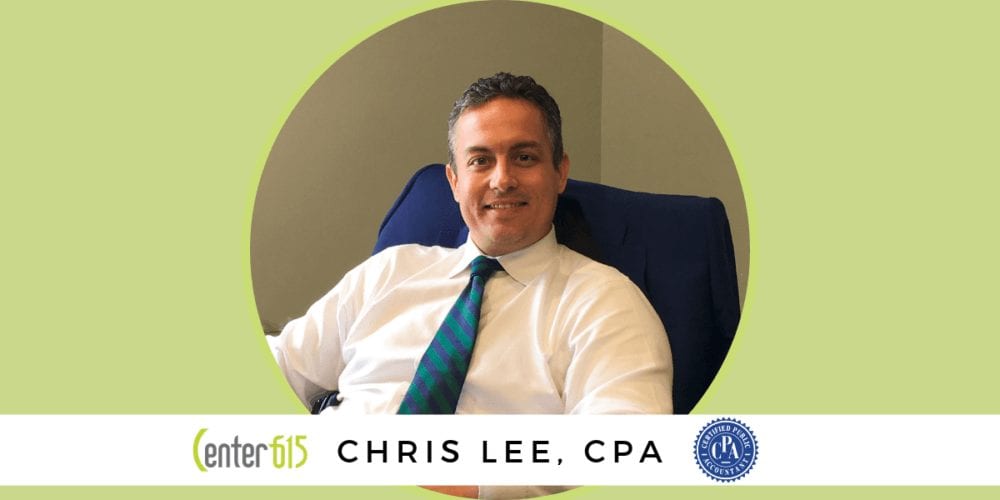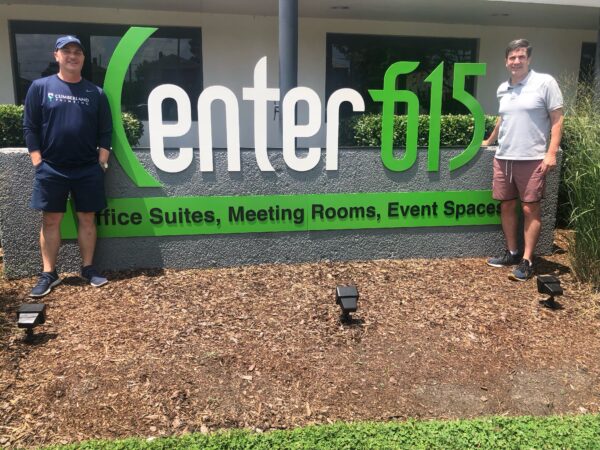Center 615 in coversation with Christopher A. Lee, Certified Public Accountant (CPA) Professional Limited Liability Company (PLLC)
On the bright and blazing afternoon of July 19th, 2019, I interviewed Chris Lee in his large and in charge office on the 2nd floor West wing. We sat on the comfy brown, leather couch, the new-leather-couch-smell still lingering, strategically placed beneath a large framed photo (of what? I can’t remember, but it was engineer-ish) that spanned the entire width of the luxurious lounging furniture. Two o’clock light broke through the generous, South-facing windows.
This particular office Chris had moved into less than a year before our documented conversation took place. Though I had caught whisperings of how magnificent Chris’s new office was, I had yet to see it for myself, so I was extra-enthused when Chris agreed to have the interview in his office, as opposed to a conference room where all of my preceding Member Spotlight interviews had taken place. Not to spoil the surprise of forthcoming spotlights, but the in-office interview, thankfully, is growing in popularity.
To preface, this interview-conversation certainly was not the first time I met or spoke with Chris. In fact, it was far from the first. Given the frequency I see him walking down the halls and outside our campus buildings, I imagine many Center 615 members have already spotted, met, or spoken with Chris Lee as well.
Seldom do I see Chris without a smile from ear to ear. When I do catch him walking around campus, he always assumes a perky posture with shoulders back, chin up, and dimples gleaming like fluorescent candy buttons.
Since I was already familiar with Chris’s friendly demeanor, I felt it safe to try a new method of interview-conversation recording via voice dictation on Google Docs, which, to my chagrin, failed to accomplish what I hoped it would. After a test-run or two and returning to my former methods, frustrated giggles stemming from incompetent technology transitioned into my first question for Chris.
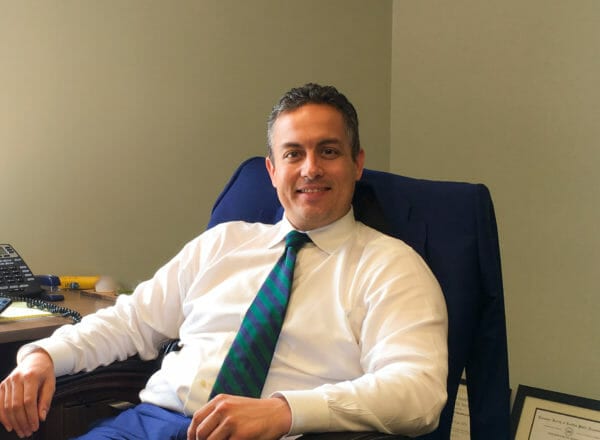
- Andra: How did you first become interested in finances and tax services?
Chris: Great question. So actually, silly answer is finances and tax services were actually a second option. My first option was to study civil engineering at University of Tennessee, Knoxville. I wanted to build roads and bridges.
However, I wasn’t able to get the finances worked out with UT Knoxville, so I ended up going to Middle Tennessee State University, which didn’t actually have a civil engineering program. When I was at MTSU, I had no idea what I was going to study. Being young, kind of nervous, my dad sitting right beside me, and the book of majors right in front of me, I felt very compelled to make the decision then and there and lock it in.
My rationale to get into finances and tax services, specifically accounting, was that every time I played Monopoly with my two younger sisters, I was always the banker. Also, I’m pretty good at math. That logic opened the door for me to start down the accounting path.
Tax services, specifically, first came about working at Jackson Hewitt Tax Services in Murfreesboro. The company had an ad in the Daily News Journal for an internship position that said “no experience necessary.” While I’m taking my accounting classes, I thought the job would be a great supplement to learn more about what accounting would be like as a career.
(Because classes, while professors may have the best of intentions, can only teach you so much.)
And it was all of the different, unique quirks and personality traits of people, and the stories of their lives, that really drew me.
I got to live vicariously through the people and their stories by their numbers. At Jackson Hewitt, they would bring me their tax forms, I would look at the forms, and it felt like a conversation. They want to be helped, I enjoy helping people, and this was a way whereby to help them.
Overtime, the intricacies of the tax form became more fluid to me and just made more sense. “If this input changes, then this output changes. Here, these schedules are related to each other. And these pieces all fit nicely together like a puzzle.”
After that first tax season ended, they brought me back on to manage the same office I had worked at. On round two, I felt more of a sense of responsibility and ownership of my work, and by extension the team’s work. With the added responsibility, I focused more on helping and connecting with every individual that walked through our doors.
The following tax season, going on from January to April, they offered me an area manager position, so I was managing six tax offices in Rutherford County: two storefronts and four Walmarts. That was the first time I had the opportunity to train, recruit, and advertise for the franchise. It was great, and It was terrifying. It really pushed and stretched my leadership and organizational skills.
Long answer to a short question, but that was really how it all kind of got started. I had an opportunity in public accounting as an intern, which led to me continuing to learn and grow in the big leagues, as they say at an accounting firm. About two years ago, everything lined up to steer the ship myself, and it’s been an amazing experience ever since.
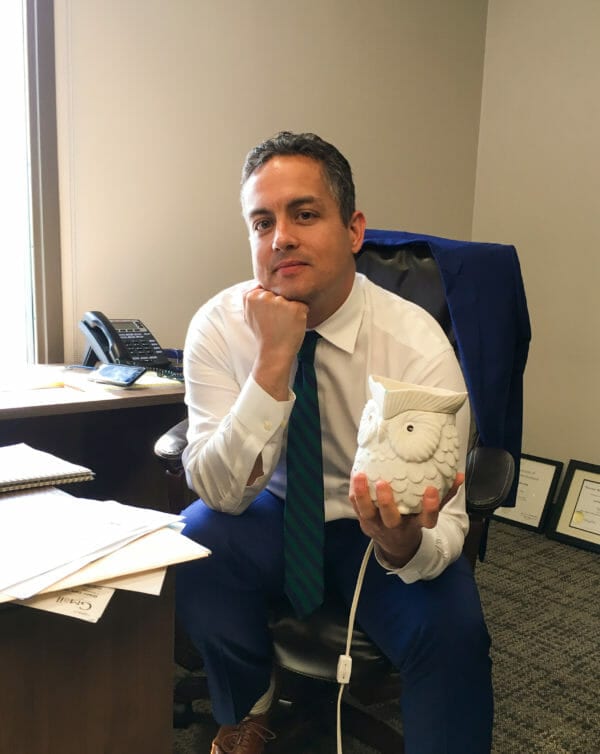
- Andra: What is one question clients always ask?
Chris: “Am I going to get audited?” [laughs] Almost every single time.
There’s this foreboding, this anxiety and uncertainty about the IRS. A lot of it stems from the IRS being this nebulous, cantankerous governmental agency that has a naturally adverse relationship to Citizens because we have to give them the money, though we might not necessarily see benefits equal to what we’re giving.
You might not be paying exactly the same dollar as your neighbor due to various factors, and all of that drives people to wonder, “am I doing this right?” That small amount of uncertainty leads to, “am I going to get audited?” Working as a liaison between clients and the IRS, that could be farther from the truth most of the time.
- Andra: Dumb question from Ms. Inexperienced: as a person who’s never done taxes before, can you explain exactly what auditing or being audited is?
Chris: Sure, absolutely. It’s not a silly question. Oftentimes, family members will help with people’s taxes. You could be on up in your 30s⏤and maybe beyond. As a matter of fact, a family I was meeting with earlier this week, their grandparent does the whole family’s taxes. It’s not unheard-of.
For an audit, it’s basically like the IRS saying, “I want to fact-check your return.” When you file a tax return, what you’re doing is, you’re saying “here’s what happened.” On your behalf, they get information from employers and various sources. The IRS is matching all the information up with your tax filing. If they see something that’s got them confused, or in their mind warrants some further explanation as to why is your tax return differs from all these other sources that they receive data from, they’ll audit. In a perfect world, all the information would line up, but oftentimes business owners may have a lot of things that aren’t reported to the IRS. Because of that, it’s very important to save your documentation whenever you file your taxes.
- Andra: What made you decide to have your business here at Center 615?
Chris: Tyler Cauble of The Cauble group was kind of the gatekeeper for me. I was scouting different cost-effective, geographically vital areas in Nashville where I could start building a team, start hiring people, and bring clients to. When I first started my practice, I would meet clients at their home, at coffee shops, at restaurants, etc. While those locations were super convenient for them, it became difficult to meet clients in Franklin, or in Murfreesboro, and then have the time to actually do the work, too. I looked at a couple places, but it was within minutes of even just walking into the front of Center 615 that I knew I needed to be here. It was a gut thing. As Whitney Yeldell gave me the tour, there were just so many yeses, for example, the parking, all the conference room spaces, the location off the interstate, which would be an easy on and off for me and others; it’s close to downtown, but not in downtown.
All amenities aside, I sensed a community culture that I didn’t really get from the other places that I had looked at. In the past, I associated working space as a place to arrive for your business, a place to get work done, and not a place where you can have fun, relax, and actually meet people that aren’t related to what I’m doing.
Here, there is a freedom to interact with other people, but in a way that’s not forced. With the mission to facilitate community in terms of the mixers, to bring amenities here that can be just unintentional connectors, like a food truck…I mean, you go get something to eat, yes that’s cool, we all have to eat, but you might run into somebody that’s working right down the hall from you. Little moments like that. And the mixers, you don’t have to go to them, but if you do, that’s an opportunity to possibly meet people that not only could help your business, but you also could help theirs. Mixers are a way to be better acquainted with the resources here that go beyond free parking. People are the most valuable resource. They’re priceless; people are priceless.
It’s inspiring to me to see people working as hard as I am, at things other than accounting. Like, they’re amazing at the things they’re amazing at. During tax season, I’ll see somebody else here working hard late at night and think, “I see you, so I can do it, too. Thank you for helping me feel like I’m not alone, by myself, dragging it out.”
- Andra: Going along the same lines, what have you been able to do here at Center 615 that you think you wouldn’t have been able to do elsewhere?
Chris: Due to the community that exists here, and being able to engage the talents of other people to help during our growing process, I think that the growing pains of the practice would have been a lot more exaggerated elsewhere.
For example, when we first moved here it was during tax season, and things were growing really fast. I had met Florin with StaffSource at a mixer; we went to lunch, and he picked my brain about what my business would look like for the next 12 months, which triggered thoughts in my mind that made me realize that I would need a bigger boat. I need to get a bigger office to accommodate the things that I foresee happening. I’m going to add more people, we’ve got a lot of work, and I’m thinking we’re probably going to get more business. Immediately, I took action to get those wheels in motion, to move into this bigger office space.
Once we got here, we still had furniture for an office that was less than half the size of this one, and still trying to manage a business. I don’t know layout. I don’t have AutoCAD. I don’t know the best way to move this desk or that desk, let alone have time to go shopping, but at a Center 615 Connects I met Reinalisa Santoyo, who has a design practice here. She had mentioned floor planning and spacial planning for businesses, which stuck in my ear. I engaged her to help me in terms of layout, pricing, coordinating people delivering the things, and just getting all the amenities that we need to keep business growing.
Because of the talents and strengths of members here at Center 615, we’ve actually been able to reinvest the time we would have taken moving and growing, into taking care of our people and business better. Without Reinalisa and Florin, the growth would have been painful. Instead, it’s been exciting.
Andra: I do really like this that you have going on in your office. It’s open and organized.
Chris: You may have noticed that we brought in parts of Center 615 that I really like: meeting rooms, nap rooms, office spaces. So, if you need a quick recharge, now there’s a couch. If the conference rooms are booked up and a client needs to have something signed right now [tongue clicks, gestures hand towards area between windows]…table and chairs right there.
Andra: And I love this lighted, recessed ceiling.
Chris: Yeah, I really like that light! The favorite part of my day is just pulling up the blinds on the windows. It’s kind of like my “we’re open” or “we’re closed for the day.” This particular office has amazing views of downtown. I got the Batman Building there, a nice church here. It’s just such a blessing to get this specific spot, and I’m thrilled that we can stay here in the midst of growing because this is a popular place to work. Part of my concern of moving spaces was, “can we stay at Center 615? Can I find space that’s not too big, but big enough?” and sure enough, we did!
- Andra: So, when I think of an accountant, I think of someone who’s kind of reserved, to themselves…but you, you’re very lively, and you have a good sense of humor. So, how do you do that? How do you keep things lively as an accountant?
Chris: Part of that is like asking, “what makes you you?” And it’s just part of my DNA. I think some people are more outgoing, and some people are just not. In the accounting profession, you’re right. By and large, there’s a lot of people that just kind of want to stay in their lane and in their box. I played the tuba and the trombone in high school and first semester in college, so I’ve always had an appreciation for music, for the Arts. I’ve always kind of had friends that were in that space, so some of that, I think, rubbed off on me over the years.
I want to find a way to make this part of my life, but not make it who I am. Yes, it’s what I do, and I love what I do because I get to help people; it’s my mission to take my gifts and use those gifts to help others. Accounting is the medium whereby to do that. Not everyday is rainbows and butterflies, but if I can stay in that mindset of my mission, then that makes things go a lot more easily. As a result, people are happier, I’m happier, and then work isn’t really work anymore. You’re just here and just living your life.
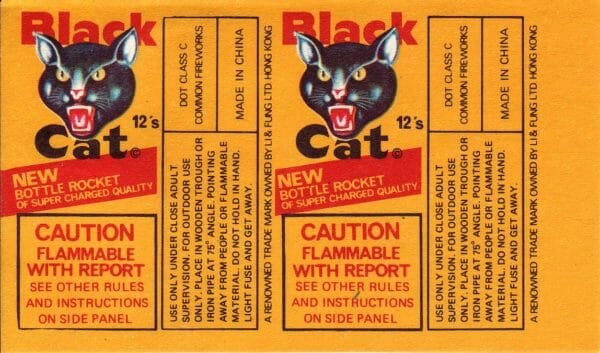
- Andra: I like that answer. I also love that story that you told me about the fireworks incident at Christmas as a kid. Can I put that Christmas story on the record and share it with the people?
Chris: It’s so redneck! But that’s okay! You know, when that first happened, I had a choice to make.
Being legally blind in your left eye, you can be a victim, or you can be victorious, and you can overcome it. I was very tempted to let that be something that defined me.
“I’m blind in my left eye, or I’m legally blind,” or whatever. I still see. I can’t really see well, but I see some depth.
Anyway, it was a pivotal time. I was eight. It’s Christmas Eve, and on Christmas Eve our family tradition is to go to my Granny’s house on my dad’s side. Every year we’d have a huge spread with all kinds of food, a separate table for dessert, just this massive amount of food, and a tree chock to the gills with presents.
So, in between eating and opening presents, we’d let the food settle by going outside and shooting fireworks. There’s a farm, we’re out in the country, way out in the country, and out in the front yard there is a field where we would light the fireworks. The adults would be the ones lighting them, and everyone else would form an arc of about 10 or 15 yards back away from where they were firing them off.
Instead of lighting one bottle rocket, we did it big. We’d light multiple bottle rockets, and then, “oh, we’ll tie the fuses together and we’ll light off 10.” Well, then, somebody had a bright idea. They were going to light off an entire gross, which is 144 bottle rockets. It’s like a pack that you buy at the store. And they wanted to know if you could take the entire pack and twist all those fuses together, light them all at once, and then have all of those bottle rockets go off in the field.
To secure the bottle rockets, they used a cinder block turned on its side. So, not the most secure method of delivery there. Just grab a cinder block, put the bottle rockets in the one of the holes in the side there, and light it and run.
And that was pretty much the way it was, except this particular time, one went into the crowd and into my left eye.
Everybody’s mortified. They can’t believe what’s happened. Dad rushes me to the ER. They do some surgeries while I’m there to see, first off, what happened? Can anything be repaired? Any kind of fragments that are still in the eye, gotta get those out.
If my memory serves, the way that impact landed in my eye, it was an inch or so away from hitting some nerves that could have been lethal, but weren’t. Regardless, part of the impact caused cellular damage to the back of the eye that is non-regenerative, causing a blind spot and glaucoma. They removed as much as they could, but it did shatter the lens in the eye, which created a cat eye effect that you can see now.
Oddly enough, some people don’t really notice my left eye until random points in time. They’ll just stop me with a shocked look on their face and ask if I’m okay. Then, I realize they actually saw that something might not be all good with my left eye.
Andra: It’s kind of like a David Bowie thing, you know? Because he had like a permanently dilated pupil in his left eye.
Chris: Really? Heck yes, I’ll rock that! See, I’m like David Bowie.
- Andra: I saw on the bio on your website you served “Board of Governors of the Young Professional Organization Nashville Junior Chamber of Commerce two separate terms, as Treasurer and Philanthropy operations,” and you are currently “serving as treasurer of the non-profit organization Music City Tres Dias”?
Chris: All correct.
Andra: First of all, what is Music City Tres Dias?
Chris: Ok, “tres dias” is Spanish for “three days”. Nashville, or Music City, is one of many geographical regions for this international organization, whose mission and purpose is growing Christian leaders through being Christ-like servants. The three day event takes place here at least twice a year.
While the mission and purpose is to grow servant Christian leaders, the organization is ecumenical, which means that it includes all denominations. It’s not non-denominational, per se⏤I mean, it accepts everybody.
Andra: Non-denominational technically is a denomination, but ecumenical includes all denominations, including non-denominational, Church of Christ, Baptist, etc., is that right?
Chris: Basically, do you believe that Jesus Christ died and raised from the dead for your sins? You’re invited. Or do you just want to have a closer relationship? Do you want to know more about this? But the organization has changed my life!
I had been a very strong Christian in high school and did a complete 180° in college. I started running with people that could care less, and I thought maybe I was just going to take a break spiritually. But a lot of things started to happen in my personal life. I was suffering from depression and substance abuse; I had gone through a divorce, and I was very overweight. I felt very depressed and really had a bad self-image. My two sisters and brother-in-law had experienced this organization, and then my mom and stepdad experienced it. They all kept inviting me to do this thing, to attend this three-day weekend.
After blowing them off twice, or three times, I finally said, “you know what, I’m going to go. I’m going to do it.” And it really broke down some emotional walls for me, and I felt this freedom and this forgiveness that I didn’t even know I could experience. Nothing happened on the outside, but on the inside I was like a completely different person. I was able to find self-forgiveness, which I think a lot of people might wrestle with, but they don’t really know that’s what it is. But it really helped me to get down to the roots of some of the pain that I felt and to take it out. Ever since then, I have been volunteering.
The organization is all volunteer-based, at least at the local level. There’s no paid staff, and each weekend consists of about a hundred people volunteering, actually paying to volunteer. In all, there’s about 30 people who attend the weekend that don’t pay; somebody sponsors them, so all it really costs them is their time. You just get invited and experience it. I volunteered after attending, and later they invited me to become the Treasurer of the organization. That was just a way for me to use my talents for an organization that has changed my life.
I was like, “okay, well, I have received, now I’m going to give back.”
Andra: Cool, so then the other organization?
Chris: So, The Nashville Junior Chamber is for young professionals of all industries, ages 21 to 35. There’s alcohol at all the conferences, so they have to be at least 21. As soon as I got into public accounting, I signed up. It was the first professional organization I joined, so this all happened before experiencing Tres Dias.
It’s a great way to make friends, influence people, meet potential clients. For me, I was young. I thought I was going to get some business out of it, and I didn’t really receive a whole lot of business, but I did make a lot of friends.
Plus, becoming the Treasurer for the Junior Chamber was a way to learn more about what being on the board of a non-profit would be like. My mentor told me that one way to really grow and be successful is to be on the board of a non-profit, and with the accounting background, being a Treasurer was a natural fit.
I served that term, but I had to step down part of the way through. I had to re-center my life and step away from the organization completely for about a year or two, and then slowly I became more involved again after experiencing the Tres Dias weekend.
Except this time, I’m involved in philanthropy. Because somebody said, “Chris, you need to run for the board.” I said, “Hell, no. I’ve already done that. I’ve been the Treasurer.” They said, “Well, what if you were in philanthropy?”
Philanthropy is the non-profit volunteering aspect, so it’s engaging non-profits in the city, getting teams together, leading the teams, helping everybody stay energized about whichever non-profit they’re helping, and finding ways to get people involved and give back to the community. That was really the core focus, and I loved it. When my term was up and I became 35, I was out, then I found other networking groups, and that was that.
Andra: What are some of the benefits in joining young professional organizations, besides meeting people, networking, and stuff? Do you get to explore the city more? Is it something you would recommend to other people that aren’t necessarily young professionals? [like myself]
Chris: Yes, because the other thing this: you get what you give, is what I’ve been taught. And it’s that way with most anything. There is character development that can take place, that goes beyond just making friends, or trying to get business. It can grow you as a person, in terms of being able to go into a room and have more social confidence, if that’s something that you struggle with. [Is he speaking directly into the deepest recesses of my mind?]
Earlier in my Treasurer time, social confidence was something I was struggling with, and a lot of it had to do with self-image. “Will people like me? Will they not? Maybe they’ll like me if I have two drinks, or three drinks.” It was always a, “what can I get out of it” kind of mindset, rather than, “how can I contribute?” And if you have the latter mindset, you’ll receive so much more than what you could even imagine.
Those relationships that I created at the Junior Chamber, I still have. Some of them now are actually doing great things in Nashville, and they’ve asked me to be their accountant. It’s ironic because I’m not looking for that business anymore, and I’m getting it. And back then I was looking for it, but not getting it.
Andra: That’s poetic.
Chris: When you live by giving first, great things happen.
Andra: You’ve got a lot of wisdom, you know?
Chris: Thank you.

- Andra: This is going to be a hot button topic. So, everyone knows who Jeff Bezos is, and all his tax cuts…
Chris: He didn’t pay any taxes last year, and why?
Andra: Precisely. So, do you have any thoughts on wildly rich people not paying taxes?
Chris: I do have thoughts on this because I work with wildly rich people. I mean Jeff isn’t a client yet but…
Andra: Yet [laughs]
Chris: [laughs] See what I did there? Okay, wealthy people pay people like me to keep as much of their money as they possibly can. The reason why Jeff, Donald, Bill, their peers, and others don’t pay much in taxes has a lot to do with the way the current tax system is. First off, you can’t know the whole thing. It’s so massive that there are people who will specialize in a very narrow topical area and just own it, just become masters of that particular subject matter. People in the same income stratum of Jeff Bezos have teams of experts looking at every little regulatory loophole they can possibly find. It’s completely legal, but they’re reading the law and they are leveraging the tax code to the hilt.
Actually, I did a little bit of research. Specifically with Amazon, I mean, I get stuff shipped from them all the time, everybody does⏤in an hour. They’re making billions and billions of dollars. Surely, they have to pay taxes. Here’s why they’re not: because they have a low margin. Margin is the difference between what you sell it for and what you make it and buy it for, so it’s your cost. You buy something from Amazon for a thousand bucks, but Amazon has to pay nine hundred bucks, which means they’re getting one hundred dollars from that one thousand dollar sale. Of all the billions of dollars that they made in 2018, their net was 9.4 billion dollars. That is still a lot of money, but it ain’t the hundreds of billions of dollars that they had in sales.
Another reason they are not paying taxes is because once upon a time, Jeff Bezos was working out of his house, and working out of offices, spending a ton of money, and losing more money.
Andra: On books.
Chris: Yeah! So, all those losses back in the day, the tax code says, “you get to keep them for twenty years until you use them, and you get to apply them to the future.” So, he’s writing off his losses from years gone by, when Amazon wasn’t Amazon. But now that Amazon is, he can go back and say, “hey, I want to use those losses back in the 90s, or early 2000s. I want to deduct them now,” and that’s totally legit.
- Andra: Okay, I see. Let’s do a lightning round of this last handful of questions: What’s your proudest achievement? What’s your biggest challenge? What would you like to accomplish in five years?
Chris: Proudest achievement is losing 90 lbs. Biggest challenge…losing 90 lbs. “What would you like to accomplish?”…I don’t know, what wouldn’t I like to accomplish in 5 years? That’s a long time.
Starting my practice and moving into this office happened in less than two. So I was pulling a Jeff Bezos, working out of my apartment, when I started this thing July 27th of 2017. Today is the 19th, so almost two years ago from the time I said, “I quit,” to today.
Andra: Where did you quit?
Chris: A mega accounting firm, one of the top 20 in the nation. One of the partners there is still my mentor. As a matter of fact, he’s referred me business, and we still see each other from time to time. He’s like a father figure to me.
My mentor taught me so much about running an accounting practice. I’d done the Jackson Hewitt Tax Returns, but those are so simple and straightforward in comparison to public accounting. You don’t always know what you’re getting into when you meet with a client, and they require a lot of specialized help. But he grew me professionally and helped root my business. I owe part of my success to him for that.
Andra: Is that him over there in that photo?
Chris: Actually, that’s my dad in the photo. I lost my dad in November of last year. He was working on a job site at the time in Murfreesboro and stopped by the building here without me knowing, before I was moved in all the way. He scoped out the place. I think it was Autumn who gave him the official tour around the building. The Sunday following the tour, he called me and said, “I stopped by your work last week. You did good; I’m proud of you.” It meant a lot to hear that from him. And the last words I heard from him were, “I love you, and I’ll see you Thursday,” which was the day of the open house for my firm, but he passed on that Tuesday.
Andra: I’m sorry for your loss, but it is very heartwarming to hear that he was proud of you and expressed that directly to you. That was my last question. Do you have any for me?
Chris: Yes. Do you know any publishers? Maybe I should write a story. I’ve got a lot of good tales…
Andra: That doesn’t surprise me! I’ll let you know if I find someone.
Center 615 would like to thank Chris Lee for being an awesome member, a frequent community participant, and allowing us to interview him for a Member Spotlight!
